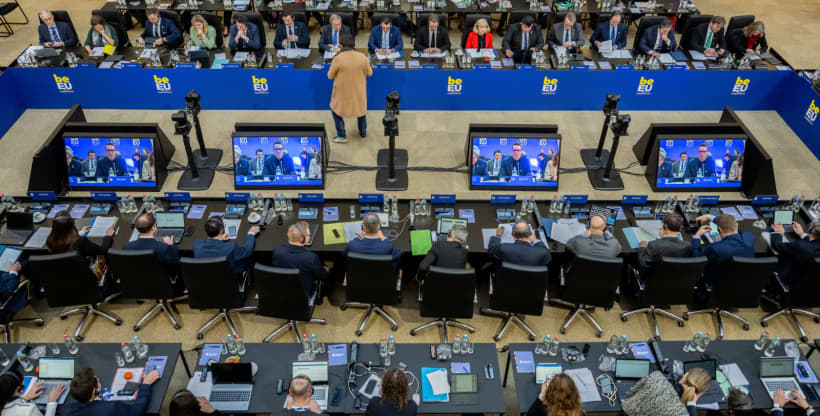Flanders and the EU agenda: preliminary results of the presidency
Belgium has held the presidency of the Council of the European Union since 1 January 2024. Since many European themes fall within Flanders’ competences, Flanders also plays an important role in this EU presidency. In addition, Flanders acts as president for the Industry, Youth, Culture, Media and Fisheries areas. After two months of presidency, we can make an interim evaluation of Flanders’ results.
With the presidency, Flanders aims to act as a catalyst for the EU agenda, with a strong emphasis on innovation, connection and resilience and by highlighting themes in which Flanders is a frontrunner in order to stimulate and inspire European policy.

These priorities summarise Flanders’ programme for the EU presidency:
Smart competitiveness
Twin transition
All together
Reaching out to partners
What has Flanders accomplished or contributed to during the first two months of the EU presidency? A non-exhaustive overview.
Smart competitiveness
Flanders actively promotes smart competitiveness in order to strengthen European growth and prosperity.
In recent years, the European industrial sector, among others, has faced complex challenges that are putting European competitiveness to the test. On 8 and 9 February 2024, the Flemish Minister responsible for Industry and the Federal Minister for Economy welcomed their European counterparts to Genk for the informal Competitiveness Council(opens in new window) under the Belgian EU presidency. During that two-day event, the European ministers reflected on the future of the internal market and European industry.
Flanders also led the negotiations for the agreement on the Net-Zero Industry Act(opens in new window). That legislation aims to promote the net-zero industrial technologies needed to achieve the EU climate goals. Flanders also organised a two-day conference on PFAS contamination(opens in new window), launching the new Knowledge Centre for Innovative Remediation Solutions (KIS) for technologies to remediate PFAS contamination.
It is also important for Europe to shape its digital future amid global competition. That was the focus of the event ‘Research to Reality – Digital Solutions to European Challenges(opens in new window)’, which took place on 5 and 6 February 2024. There, the general consensus echoed that Europe has all the makings to play a key role in the digital revolution, but that ‘research and implementation must then complement each other seamlessly’.
Twin transition: digital and green
To achieve the EU’s economic and environmental goals, Flanders advocates for investments in green technologies and an accelerated digital transformation of society as a whole. As such, the green and digital transitions are intrinsically linked.
Flanders is an international pioneer in the field of digital transition. At a conference in Ghent on 8 February 2024, governments and organisations were invited to sign the Ghent Manifesto: a declaration of intent confirming their support for strengthening data-driven audience development in the cultural and creative sectors.
In terms of green transition, Flanders is also focusing on sustainable mobility with the presidency. On 30 January 2024, the EU Cycling Conference took place in Hasselt, at the initiative of the Flemish Minister for Mobility and Public Works. That conference led to a European Declaration on Cycling that will guide future cycling policy in Europe.
All together
Furthermore, Flanders is committed to strengthening the self-reliance and inclusion of all EU citizens. In this way, we want to ensure that all European citizens can share in Europe’s prosperity and growth.
Independent media are an indispensable pillar for a functioning democracy. On 19 January 2024, the Council and the European Parliament reached an agreement on the European Media Freedom Act(opens in new window), an important milestone in protecting media diversity and independence in the EU.
With a ministerial conference on integration and civic integration(opens in new window) on 9 February 2024 in Mechelen, Flanders also placed the civic integration of newcomers in an increasingly diverse European society on the presidency’s agenda.
Reaching out to partners
Collaboration is the key to success. Global challenges require global cooperation. Flanders actively seeks to establish partnerships with other European federated states, Member States, and external stakeholders within the EU in order to achieve common goals.
Flanders participated in the European agreements for the planned network of roads, railway lines, airports and water infrastructure in the European Union (TEN-T(opens in new window)) and the maritime safety package(opens in new window). As such, we are building greater connectivity between European Member States and regions.
Flanders also advocates for the EU to expand its international partnerships with the rest of the world and pursue an ambitious trade policy. It is from that open vision that we strive to create a European Fisheries Policy, with room for partnerships with non-European Union countries, such as the United Kingdom and Norway. For example, during the presidency, an important agreement has been reached on updated fisheries measures in the north-eastern part of the Atlantic.
Belgium holds the EU presidency until the end of June 2024. Wondering what else is on the agenda? Take a look at the events organised by Flanders during the Belgian EU presidency.